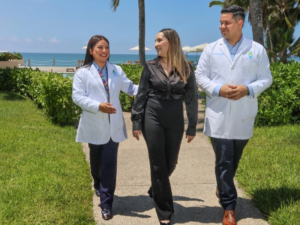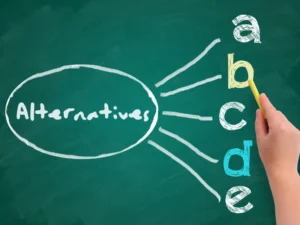Just like other chronic conditions, addiction can involve relapses. This may be a concern, but with specialized treatment at a drug rehab clinic in Mexico, there is adequate support. Addictions are progressive and can lead to irreversible disabilities if not properly treated.
Addiction is a neurological condition that requires treatment by a multidisciplinary team using specialized approaches supported by laboratory and diagnostic studies like those available at OCEÁNICA.
What are the most common causes?
Addiction, as an illness, can develop due to genetic vulnerability and a stressful environment. When someone with these vulnerabilities comes into contact with addictive substances or behaviors, it increases the likelihood of developing this disorder.
In short, addiction does not arise in a vacuum; it often builds on specific foundations like psychological vulnerabilities, altered brain mechanisms, or genetic predispositions. However, even a person without any apparent vulnerability can develop this condition when exposed to environmental factors, chronic stress, and sustained substance use.
When does a relapse occur?
Relapses cannot be hidden, and one way to prevent them is to accept the risk and understand the nature of this condition.
A relapse is essentially a return to behaviors and thought patterns associated with active addiction, which were previously overcome. This results in resuming substance use, thereby reverting to the pre-recovery state.
Relapses can be a part of the rehabilitation process; they do not necessarily signify the failure of a rehab treatment but rather serve as a learning experience, highlighting areas that may need improvement. Overcoming an addiction involves changing deeply ingrained behaviors, which means that, under certain circumstances, it can be easy to fall back into substance use.
What symptoms should be considered in patients with addictions?
Symptoms of relapse in addiction may include:
- Loss of contact with others.
- Resuming obsessive thoughts about substance use.
- Feelings of depression and anxiety that are not necessarily related to external events.
- Restlessness and insomnia.
- Frequent arguments with family and household members.
- Increased irritability and resentment.
- Defiant behavior regarding the recovery program, such as revisiting high-risk places.
- Defensive attitude, especially when discussing treatment and rehabilitation.
- Neglecting the rehabilitation program by missing meetings, specialist appointments, and more.
It is important to note that as relapse symptoms intensify, the individual’s ability to accept suggestions from those around them decreases. Scientific studies on this topic have demonstrated that stress—one of the factors linked to substance use and exposure—is a common trigger for relapse.
When has addiction been overcome?
The effectiveness of treatments in drug treatment centers in Mexico is closely related to the duration of the patient’s adherence to prescribed guidelines. The length of recovery can vary based on individual factors, the type of dependency, and severity.
For addiction recovery, it’s essential from the beginning to understand the need for long-term, specialized treatment to achieve sustained abstinence and successful rehabilitation.
Consult with experts in drug rehab in Mexico
Rehabilitation is not measured solely in terms of time but as a process. With proper treatment and the gradual adoption of a healthy and functional lifestyle, individuals can move away from substance dependence and improve their quality of life.
At OCEÁNICA, you can receive professional care in drug rehab in Mexico, supported by a multidisciplinary team that provides comprehensive guidance from start to finish. Our facilities are equipped with the necessary tools and resources to address each case effectively.
If you want to learn more about our services as a rehabilitation center in Mexico, you can fill out the form on our website, call us at (55) 88 547 141, or email us at info@oceanica.com.mx.
Sources:
National Institute on Drug Abuse (NIH). “Is Addiction Treatable?” Available at: https://nida.nih.gov/es/publicaciones/las-drogas-el-cerebro-y-la-conducta-la-ciencia-de-la-adiccion/tratamiento-y-recuperacion#:~:text=La%20terapia%20cognitivo%20conductual%20busca,m%C3%A1s%20probable%20que%20consuman%20drogas.
Revista Costarricense de Psicología. “Risk Factors Influencing Relapse in Legal and Illegal Drug Use Among Adolescents Treated at the Institute on Alcoholism and Drug Dependence.” Available at: https://www.scielo.sa.cr/pdf/rcp/v34n2/1659-2913-rcp-34-02-00147.pdf
Revista del Hospital Psiquiátrico de La Habana. “Prognostic Factors for Relapse in Patients Undergoing Addiction Treatment.” Available at: https://revhph.sld.cu/index.php/hph/article/view/476











